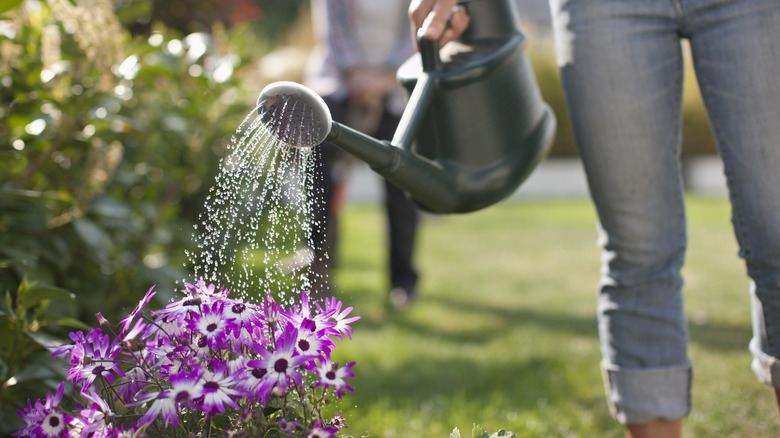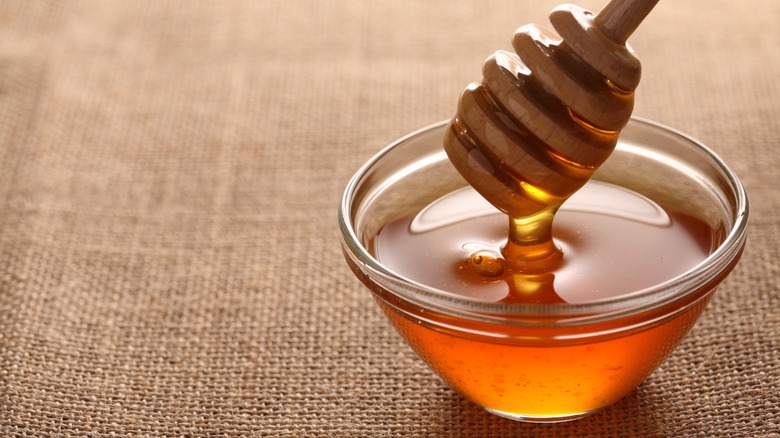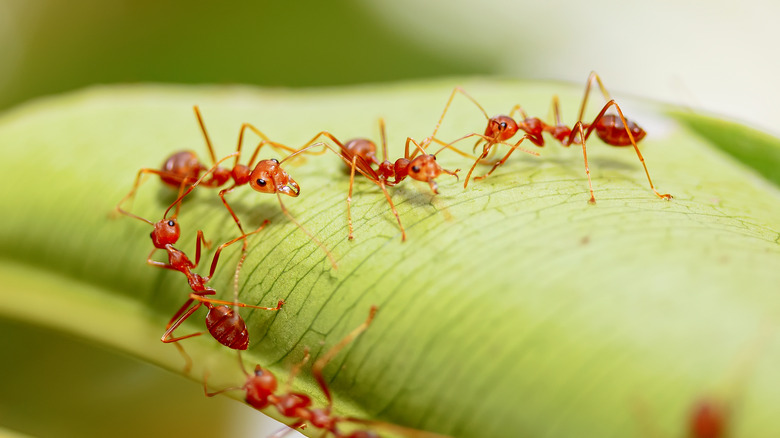The Ingredient You Can Use As A Natural Fertilizer In The Garden
Fertilizing plants throughout the growing season is an essential power boost for optimum growth. Fertilizers provide essential nutrients like phosphorus, potassium, and nitrogen that soil might lack or that plants will naturally consume over time. These nutrients are important for promoting strong roots, vibrant leaves, and robust flower or fruit production. Consistent fertilizing ensures plants get the sustenance they need, preventing deficiencies and infections while fostering a flourishing garden. There are many types of fertilizers that can be beneficial to your garden plants whether you purchase them online, at a local nursery, or a hardware store. If you're looking for a quick fix or an inexpensive option, though, look no further than your kitchen pantry. Your bottle of honey is just the thing that may help your plants thrive.
You should be using honey in your garden in order to offer a sweet blend of benefits with a touch of sophistication. Its composition — rich in natural sugars, amino acids, and enzymes — nurtures a favorable environment for beneficial microbial activity in the soil, encouraging better nutrient absorption by your plants. Beyond sweetness, honey's antimicrobial properties fortify soil health against potential pathogens. Functioning as a thoughtful fertilizer, it supports robust root development, reinforcing plant immunity. This eco-friendly alternative avoids synthetic chemicals, presenting a simpler approach for you to cultivate a resilient and thriving garden. So next time you're sweetening your cup of tea, consider sharing some of your sweet treat with your hungry garden plants.
How to use honey as a natural fertilizer
Harnessing honey as a natural fertilizer involves a simple yet effective process. To create a honey-infused solution, start by selecting raw, unprocessed honey, preferably organic, for its rich array of nutrients and beneficial properties. Begin by mixing one to two tablespoons of honey with a gallon of boiling water. Stir the solution thoroughly, allowing the honey to dissolve completely. The boiling water sterilizes the mixture, minimizing the risk of introducing harmful microbes to the soil.
Once the honey solution is well-mixed, let it cool to room temperature. This ensures that the solution is suitable for application without causing stress to the plants. Transfer the cooled honey solution to a watering can or a sprayer for easy and uniform distribution across the garden. Apply the honey solution to the soil around the base of plants, ensuring even coverage of the root zone. The natural sugars in the honey will activate microorganisms in the soil, promoting nutrient availability for the plants. This process not only enhances absorption but also contributes to the overall soil health.
For an effective honey fertilization routine, apply the solution every two to four weeks. This frequency ensures a consistent supply of nutrients, supporting continuous plant growth and development. Incorporating honey as a natural fertilizer not only nourishes plants but also encourages a resilient garden.
Potential drawbacks of using honey in the garden
While honey water can offer benefits as a natural fertilizer, over-fertilization poses risks. Excessive application may lead to an accumulation of nutrients in the soil, causing imbalances that can adversely affect plant health. Plants are sensitive to nutrient ratios, and an overabundance of certain elements may lead to nutrient toxicity, hindered growth, or even plant damage. A soil test can help you determine if honey water — or any fertilizer — is currently necessary to amend your soil for beneficial plant growth.
Additionally, the sweet nature of honey water can attract pests, particularly ants. Ants are drawn to the sugars in honey, and their presence in the garden can become problematic. They may disrupt the soil structure by building nests, leading to potential damage to plant roots. Moreover, ants often cultivate and protect honeydew-producing insects like aphids, creating a secondary pest issue. It's advisable to use honey water judiciously and avoid applying it in ways that could attract an excessive ant population.
Finally, certain plant species may not benefit equally from honey water as a fertilizer. Plants with specific nutrient requirements or those adapted to particular soil conditions might not respond favorably to honey water. Conducting thorough research on the nutritional needs of your individual plants and the compatibility of honey water with different soil types is recommended to avoid unintended consequences. For example, coneflowers, asters, and rock roses are a few perennials that do not require additional fertilizer in order to thrive.


